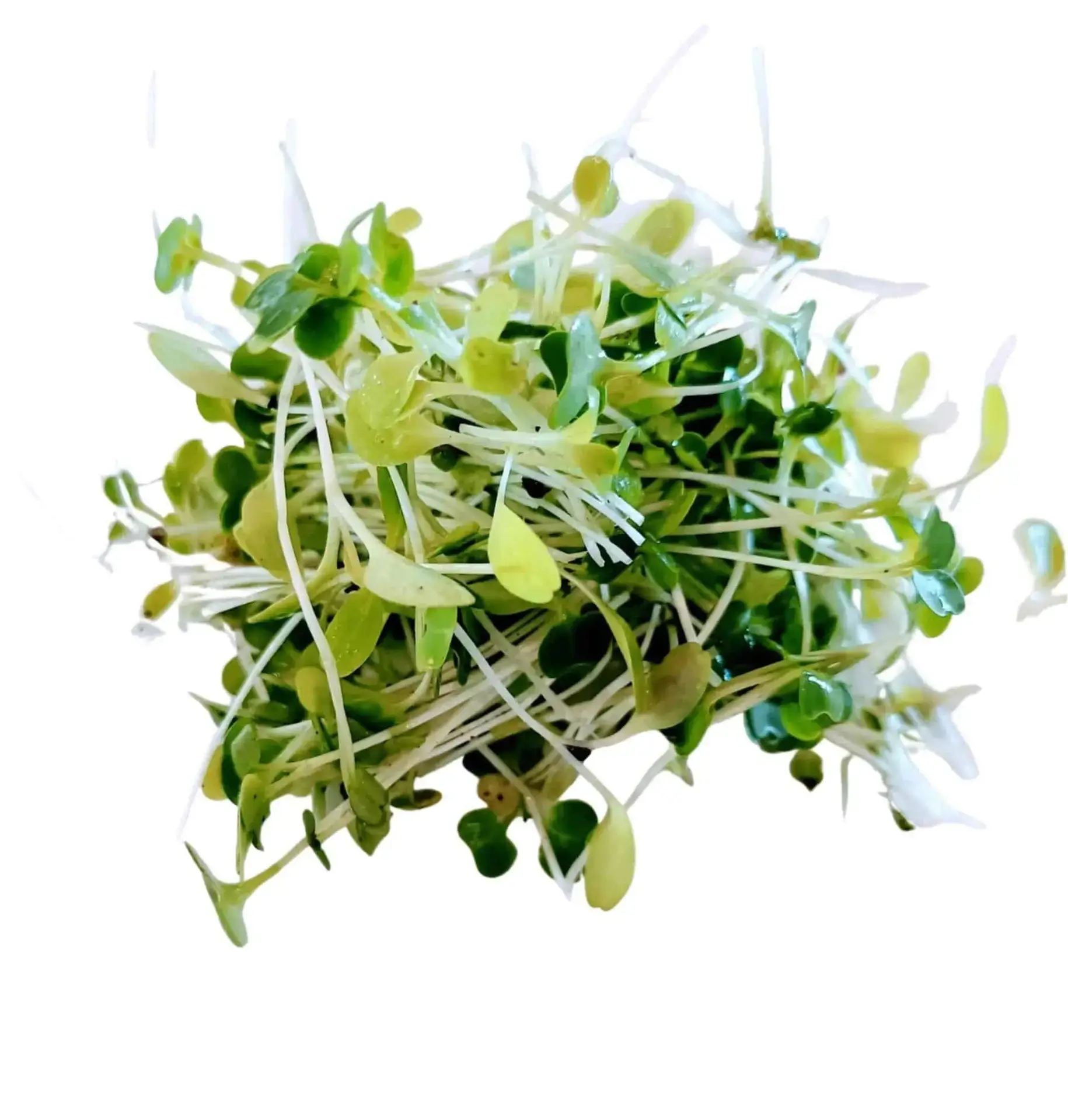Mesclun Microgreen Nutrition Fact Sheet

Mesclun microgreens are a miniature marvel in the world of nutrition, offering a cornucopia of health benefits despite their diminutive size. These delicate greens are a blend of various young and tender leafy vegetables, each contributing to their impressive nutritional profile.
Nutrition and Health Benefits
Vitamins Galore: Mesclun microgreens are rich in vitamins, with vitamin A taking center stage. This essential nutrient is vital for maintaining healthy vision, skin, and a robust immune system. A mere 100-gram serving of mesclun microgreens can supply up to 100% of your daily vitamin A needs. Additionally, these microgreens provide a healthy dose of vitamin C, an antioxidant that supports immune function and collagen synthesis.
Mineral Bounty: Mesclun microgreens are a source of essential minerals, including potassium, calcium, and iron. Potassium plays a crucial role in regulating blood pressure, while calcium is vital for bone health. Iron is essential for red blood cell formation and oxygen transport in the body.
Fiber for Digestive Health: Fiber is an unsung hero in the world of nutrition, promoting digestive health and helping to regulate blood sugar levels. Mesclun microgreens contain a notable amount of dietary fiber, making them a valuable addition to your diet.
Antioxidant Powerhouse: These microgreens are rich in antioxidants, which help protect cells from oxidative stress and reduce the risk of chronic diseases. The presence of various phytonutrients, such as flavonoids and polyphenols, contributes to their antioxidant prowess.
Anti-Inflammatory Properties: Emerging research suggests that mesclun microgreens may possess anti-inflammatory properties. Consuming foods with anti-inflammatory compounds can help reduce the risk of chronic diseases like heart disease and diabetes.
Potential Anti-Cancer Effects: While more research is needed in this area, preliminary studies indicate that the compounds found in mesclun microgreens may have anti-tumor properties. These studies, conducted in vitro, show promising results, but further investigation is necessary to understand their implications for cancer prevention and treatment in humans.
Heart-Healthy Benefits: Some studies suggest that mesclun microgreens may benefit cardiovascular health. Antioxidants found in these microgreens may contribute to reducing the risk of heart disease by lowering cholesterol levels and inhibiting plaque formation in arteries.
Incorporating mesclun microgreens into your diet is an easy and flavorful way to boost your nutrient intake. You can toss them into salads, use them as a garnish for various dishes, or blend them into smoothies for an added nutritional punch.
In conclusion, mesclun microgreens may be small in size, but they are big on nutrition. With their impressive array of vitamins, minerals, antioxidants, and potential health benefits, these tiny greens can play a significant role in maintaining a nutritious and healthy diet.
References
Kim, M. J., Moon, Y., Tou, J. C., Mou, B., & Waterland, N. L. (2016). Nutritional value, bioactive compounds and health benefits of lettuce (Lactuca sativa L.). Journal of Food Composition and Analysis: An Official Publication of the United Nations University, International Network of Food Data Systems, 49, 19–34. https://doi.org/10.1016/j.jfca.2016.03.004
Shi, M., Gu, J., Wu, H., Rauf, A., Emran, T. B., Khan, Z., Mitra, S., Aljohani, A. S. M., Alhumaydhi, F. A., Al-Awthan, Y. S., Bahattab, O., Thiruvengadam, M., & Suleria, H. A. R. (2022). Phytochemicals, nutrition, metabolism, bioavailability, and health benefits in lettuce—A comprehensive review. Antioxidants (Basel, Switzerland), 11(6), 1158. https://doi.org/10.3390/antiox11061158
Truzzi, F., Whittaker, A., Roncuzzi, C., Saltari, A., Levesque, M. P., & Dinelli, G. (2021). Microgreens: Functional food with antiproliferative cancer properties influenced by light. Foods (Basel, Switzerland).
Folate. Fact sheet for health professionals. National Institutes of Health. https://ods.od.nih.gov/factsheets/Folate-HealthProfessional
Nutritional attributes of salad vegetables - Scientific Figure on ResearchGate. Available from: https://www.researchgate.net/figure/Core-nutrients-and-phytochemicals-in-some-component-plants-of-a-mesclun-mix_tbl1_268516167
Oria, M., Harrison, M., & Stallings, V. A. (2019). Dietary reference intakes (DRIs): Recommended dietary allowances and adequate intakes, elements, food and nutrition board, national academies. National Academies Press.
Frąszczak, B., & Kleiber, T. (2022). Microgreens biometric and fluorescence response to iron (Fe) biofortification. International Journal of Molecular Sciences, 23(23), 14553. https://doi.org/10.3390/ijms232314553
Keerthana, P. G., & Subaratinam, R. (n.d.). A Short Literature on Microgreens: Understanding their nature and Current Research. Edu.In. Retrieved September 28, 2023, from https://www.sdnbvc.edu.in/wp-content/uploads/2023/01/PAPERID-6.pdf
Bhaswant, M., Shanmugam, D. K., Miyazawa, T., Abe, C., & Miyazawa, T. (2023). Microgreens—A comprehensive review of bioactive molecules and health benefits. Molecules (Basel, Switzerland), 28(2), 867. https://doi.org/10.3390/molecules28020867
Disclaimer: The information provided in this article is for educational and informational purposes only and is not intended as medical advice. It is not a substitute for professional medical advice, diagnosis, or treatment. Always seek the advice of a qualified healthcare provider with any questions you may have regarding a medical condition. The author and publisher of this article are not responsible for any adverse effects or consequences resulting from the use of any suggestions, preparations, or procedures described in this article.

